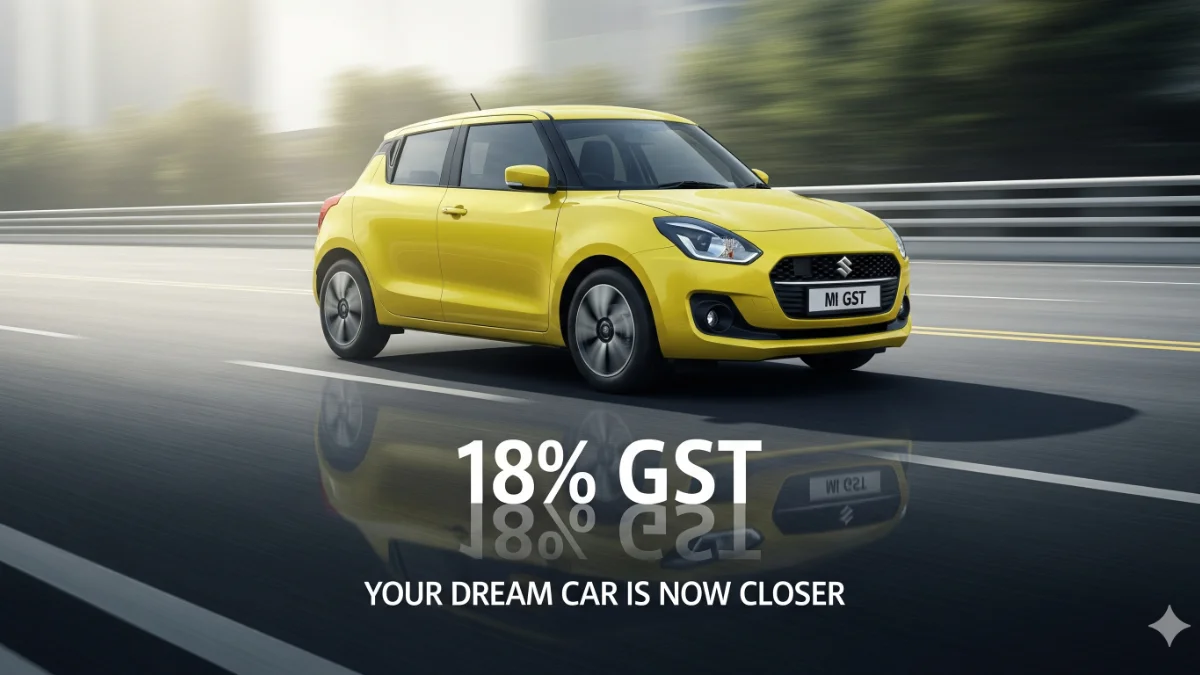Introduction:
In a landmark decision by the GST Council on September 4, 2025, the tax structure for passenger vehicles underwent a major overhaul, directly impacting Maruti Suzuki's pricing across its diverse lineup of hatchbacks, sedans, and SUVs. Effective from September 22, 2025, the new GST rates eliminate the compensation cess, simplifying taxation: Small cars (petrol under 1200cc or diesel under 1500cc, length up to 4000mm) now face a flat 18% GST, down from the previous 28% plus 1-22% cess, while larger vehicles attract 40% GST (previously 28% + 15-22% cess). Electric Maruti models, like the upcoming eVX, continue at the lowest 5% rate, aligning with India's push for green mobility.
Maruti Suzuki, commanding over 40% market share, has swiftly adjusted ex-showroom prices, passing on full benefits to consumers with reductions ranging from ₹36,000 on the Alto K10 to ₹1.10 lakh on the Grand Vitara, as per official announcements on September 18, 2025. This GST 2.0 reform, hailed as the biggest since the 2017 GST rollout, aims to boost affordability and competitiveness in the automotive sector, potentially spurring sales amid a projected 8-10% growth in FY26. Why does this matter? For budget-conscious buyers, these cuts make popular models like the Swift and Wagon R more accessible, while for the industry, it levels the playing field against unorganized players and imports. This article breaks down the new GST slabs, model-wise price impacts, eligibility criteria, historical context, expert analyses, and future implications, providing a complete guide to navigating Maruti Suzuki's revised pricing landscape.

New GST Rates: Breakdown for Maruti Suzuki Cars
The GST Council's reforms, announced during Prime Minister Narendra Modi's Independence Day address and formalized on September 4, 2025, restructure vehicle taxation as follows:
- Small Cars: 18% GST (no cess) – Applies to petrol variants under 1200cc and diesel under 1500cc, with length ≤4000mm. Examples: Maruti Alto K10, Swift, Wagon R, Celerio, S-Presso.
- Large Cars/SUVs: 40% GST (no cess) – For vehicles exceeding the above thresholds, including hybrids over 4m. Examples: Maruti Brezza, Ertiga, XL6, Grand Vitara, Fronx (select variants).
- Electric Vehicles: 5% GST – Unchanged, covering Maruti eVX and future EVs.
- Luxury/Imported: Remain at higher rates, but most Maruti models benefit from the flat structure.
This simplification removes the variable cess (1-22%), reducing effective taxes by 10-15% on small cars and 3-10% on larger ones. Maruti Suzuki's adjustments, effective September 22, 2025, ensure no cess applies to any passenger vehicle, per Hindustan Times and Autocar India.
Model-Wise Price Impact: Savings Across Maruti Lineup
Maruti Suzuki has revised ex-showroom prices for over 20 models, with the maximum benefits on entry-level and compact segments. Here's a snapshot (ex-showroom Delhi, indicative; confirm with dealers):
| Model | Variant Example | Old Price (₹ Lakh) | New Price (₹ Lakh) | Savings (₹) |
|---|---|---|---|---|
| Alto K10 | VXI+ Petrol | 5.00 | 3.93 | 1.07 |
| Swift | ZXI Plus Petrol-AT | 9.50 | 8.69 | 0.81 |
| Wagon R | ZXI+ | 7.50 | 6.86 | 0.64 |
| S-Presso | VXI CNG | 6.50 | 5.97 | 0.53 |
| Dzire | ZXI Petrol-AT | 10.00 | 9.15 | 0.85 |
| Baleno | Alpha Petrol | 9.80 | 8.95 | 0.85 |
| Brezza | ZXI Petrol | 12.50 | 11.89 | 0.61 |
| Ertiga | ZXI+ Petrol | 13.50 | 12.89 | 0.61 |
| Grand Vitara | Alpha Hybrid | 20.00 | 18.89 | 1.11 |
Savings range from ₹36,000 (base models) to ₹1.11 lakh (hybrids), per V3Cars and India Today. Electric eVX pricing remains tentative at 5% GST, potentially under ₹20 lakh.
Why the Changes? GST 2.0 Reforms and Rationale
The GST Council's September 4, 2025, reforms, the first major revision since 2017, aim to:
- Boost Affordability: Reduce taxes on mass-market vehicles to stimulate demand amid slowing sales (down 5% YoY in August 2025).
- Promote EVs: Retain 5% rate to accelerate adoption (target 30% by 2030).
- Simplify Structure: Eliminate cess, creating flat slabs (18%, 40%) for easier compliance.
Announced by PM Modi on Independence Day, the changes benefit small carmakers like Maruti (60% sales in <4m segment), per Economic Times. Industry body SIAM estimates 10-15% sales uplift in Q4 FY26.
Historical Context: GST Evolution for Cars
Pre-GST (2017), cars faced 30-55% taxes (excise + VAT + cess). Post-GST:
- 2017: 28% base + 1-22% cess (small cars ~29%, SUVs ~43%).
- 2022: Minor EV tweaks to 5%.
- 2025 (GST 2.0): Cess removed; flat 18%/40%, per CarDekho.
Maruti's response mirrors 2017's price adjustments, passing full benefits to retain market share (42% in August 2025).
Statistics: Impact on Maruti Sales and Market
- Maruti Sales: August 2025: 1.72 lakh units (+2% YoY); small cars 60% share.
- Price Reductions: Up to 10% on entry models; average 5-8%.
- Market Projection: FY26 sales 22-23 lakh units (+8%).
- EV Segment: eVX launch Q4 2025 at 5% GST.
| Segment | Pre-GST 2.0 Effective Rate | Post-GST 2.0 Rate | Avg. Savings |
|---|---|---|---|
| Small Cars | 29-35% | 18% | 10-12% |
| Large SUVs | 43-50% | 40% | 3-5% |
| EVs | 5% | 5% | Nil |
Data from SIAM, Autocar India (September 2025).
Expert Opinions: Industry Views on Reforms
RC Bhargava (Maruti Chairman): “Restructuring boosts competitiveness; opening trade borders aids growth.” SIAM: “10% sales uplift expected.” Autocar India: “Swift up to ₹81,000 cheaper—best time to buy.” Economic Times: “Maruti biggest beneficiary; small cars 60% volume.”
Consensus: Positive for affordability, but larger models see marginal relief.
Potential Impacts: On Buyers, Industry, and Economy
- Buyers: 5-10% savings; e.g., Swift ₹81,000 cheaper.
- Industry: 8-10% FY26 growth; EV push accelerates.
- Economy: Boosts auto sector (8% GDP contribution); jobs +2 lakh.
Risks: Import competition if tariffs ease. Opportunities: Export growth under PLI scheme.

Conclusion: Optimal Time for Maruti Buyers
GST 2.0's 18% rate for small Maruti cars and 40% for larger ones, effective September 22, 2025, slashes prices by up to ₹1.10 lakh, revitalizing the market. With Maruti passing full benefits, it's ideal for buyers eyeing Swift or Alto. Monitor dealer offers—explore more on nuvexic.com.
FAQ
What is GST on small Maruti cars?
18% (from September 22, 2025).
GST on larger Maruti SUVs?
40%.
Savings on Maruti Swift?
Up to ₹81,000.
GST on Maruti EVs?
5%.
When do changes apply?
September 22, 2025.



